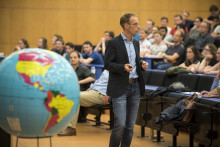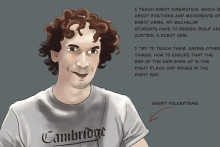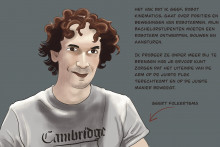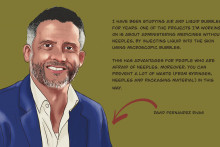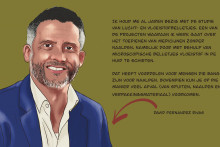What does this fellowship entail?
'It is an initiative from the 4TU Centre for Engineering Education, which takes place at the UT in the form of such a fellowship. For two years, we were given one day a week to develop and test our own educational innovation, in an evidence-based way. In doing so, we were involved in digitisation, which is actually such a broad theme that everything can fall under it.'
What did you focus on with your research?
'Within Civil Engineering, I teach fluid mechanics. What I noticed was that I often received requests from students shortly before the exam for tips and explanations about practice assignments. Actually way too last-minute, if you ask me. I wanted to overcome that and let students come into contact with it earlier, with the help of digitisation.'
How did you go about it?
'I soon found out that the Grasple platform (an online environment for teachers to create exercises, ed.) could be quite suitable for what I had in mind. The UT is already a customer; the tool is available and is already being used in mathematics education. I was particularly curious about the possible applications in engineering subjects, which are fundamentally different. Exercises are difficult to translate into digital form; mathematics is the language, but not the goal, physical reasoning plays a major role and often results in a numerical value, with a physical unit and a certain precision. You have to be able to put that away well. Fortunately, Grasple thought along well, although in some respects the tool is not yet fully suitable for an engineering profession.'
What else can you conclude after two years of research?
'Because of the differences from year to year, it was not possible to demonstrate that the students achieved a higher grade with Grasple this year than the students without it last year. But the survey showed positive reactions from students about the added value of this, especially in learning to solve problems systematically and step-by-step. Moreover, I noticed that I received fewer last-minute questions from students. That seems to me to be a positive development. If you have to run a marathon, you're not going to train at the last minute, are you?'
You all focused on digitization, which is also seen as a way to offer education more (cost) efficiently. What's your take on that?
'It's a great tool, but it's very time-consuming to put into practice properly. No, I certainly wouldn't use these kinds of resources to cut back on education. That has never been my goal. It is intended to offer something extra to students, not to replace existing education. You also have to be careful with undesirable side effects of digitisation – you don't want students to stop coming to the tutorials, which can be very instructive in other ways.'
As fellows, you also worked together. What do you learn from each other?
'Especially that education has many facets that you never really concern yourself with. The projects were therefore very diverse. Bas Kolloffel, for example, was involved in the use of VR goggles in presentation training. Pascal Wilhelm focused on the procrastination of students and Jurnan Schilder on the use of videos in education. And with Jan Buitenweg's tool, lecturers can design the curriculum together and let students determine their own study path within it. From the individual student to a course to an entire curriculum, there are all kinds of ways to review your education and try to improve it.'
Was that the main added value of such a fellowship?
'You are given the time and space to review your education. I think many teachers will recognize that you regularly have moments when you see opportunities to improve your teaching. Often there is a lack of time and space to work this out and test it. I also liked the fact that you do such a fellowship entirely as a lecturer; you are not expected to become an educational consultant.'


